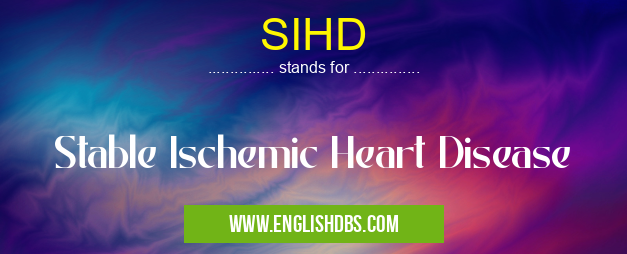What does SIHD mean in DISEASES
SIHD stands for Stable Ischemic Heart Disease, which is a form of coronary artery disease that can be managed through lifestyle changes. It occurs when the arteries of the heart become narrowed due to a buildup of plaque, causing an inadequate supply of oxygenated blood to the heart muscle and increasing the risk for a heart attack. SIHD can be prevented and treated with medications and lifestyle modifications.

SIHD meaning in Diseases in Medical
SIHD mostly used in an acronym Diseases in Category Medical that means Stable Ischemic Heart Disease
Shorthand: SIHD,
Full Form: Stable Ischemic Heart Disease
For more information of "Stable Ischemic Heart Disease", see the section below.
Essential Questions and Answers on Stable Ischemic Heart Disease in "MEDICAL»DISEASES"
What is stable ischemic heart disease (SIHD)?
Stable Ischemic Heart Disease or SIHD is a form of coronary artery disease caused by the narrowing of the arteries supplying oxygenated blood to the heart due to the buildup of plaque over time. This can increase the risk for a heart attack.
What are some signs and symptoms of SIHD?
Common signs and symptoms of SIHD include chest pain or tightness, shortness of breath, fatigue, lightheadedness, nausea or vomiting and irregular heartbeat.
What are some risk factors for developing SIHD?
Risk factors for developing SIHD include high cholesterol levels in blood, smoking cigarettes, family history of coronary artery disease, diabetes, hypertension, obesity and physical inactivity.
How can SIHD be prevented?
Some lifestyle modifications may help prevent SIHD such as eating a healthy diet low in fat and sugar and high in fruits and vegetables; exercising regularly; maintaining a healthy weight; quitting smoking; controlling blood pressure and cholesterol levels; minimizing stress levels; avoiding excessive alcohol consumption; limiting caffeine intake; and getting regular medical check-ups.
How is SIHD usually treated?
Treatment typically involves lifestyle modifications such as those mentioned above as well as medication to control cholesterol levels, reduce inflammation or thinning the blood. In more severe cases angioplasty or bypass surgery may be necessary to open blocked arteries.
Final Words:
While it's important to take steps to prevent stable ischemic heart disease (SIHD), it's just as important to promptly identify symptoms in order to begin appropriate treatment as soon as possible. By taking preventive measures while also actively managing your health care team's recommended plan follow-up visits with your doctor can help reduce your risk for a future event.
